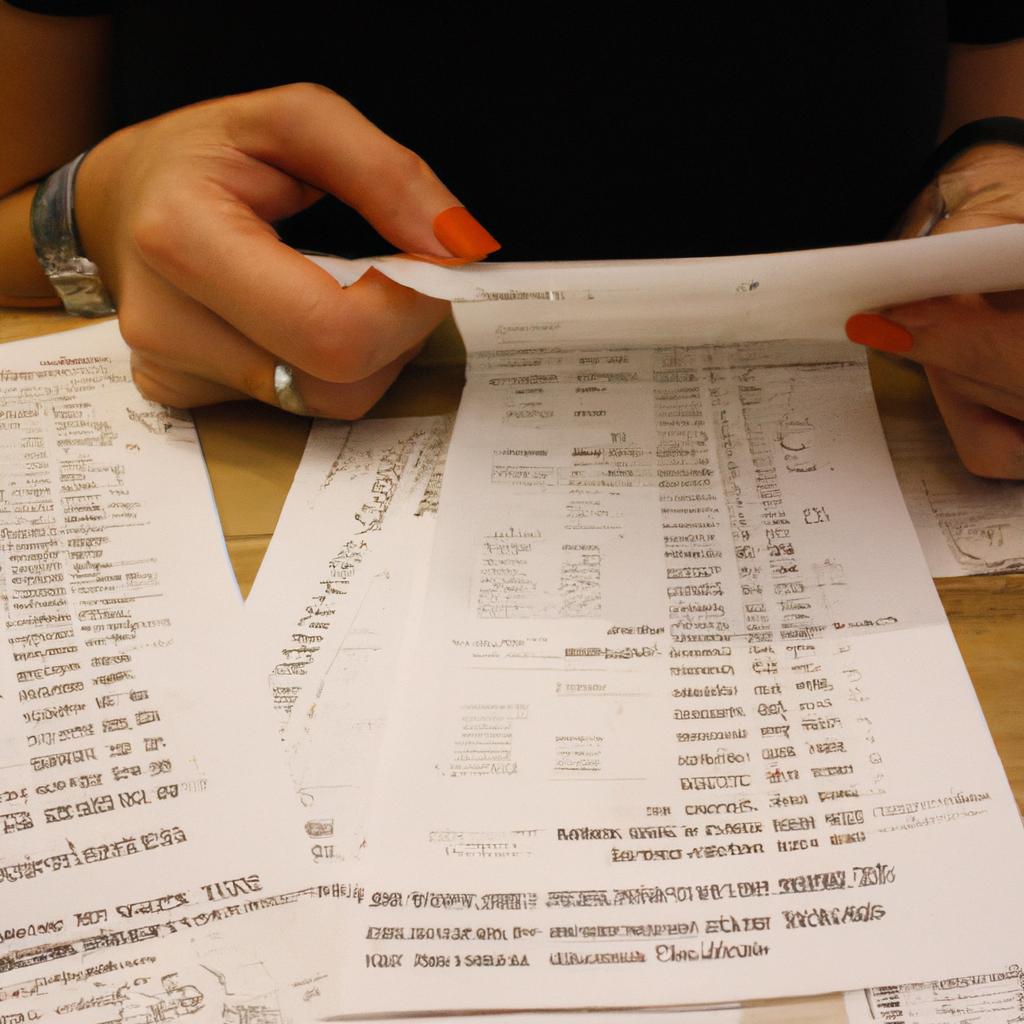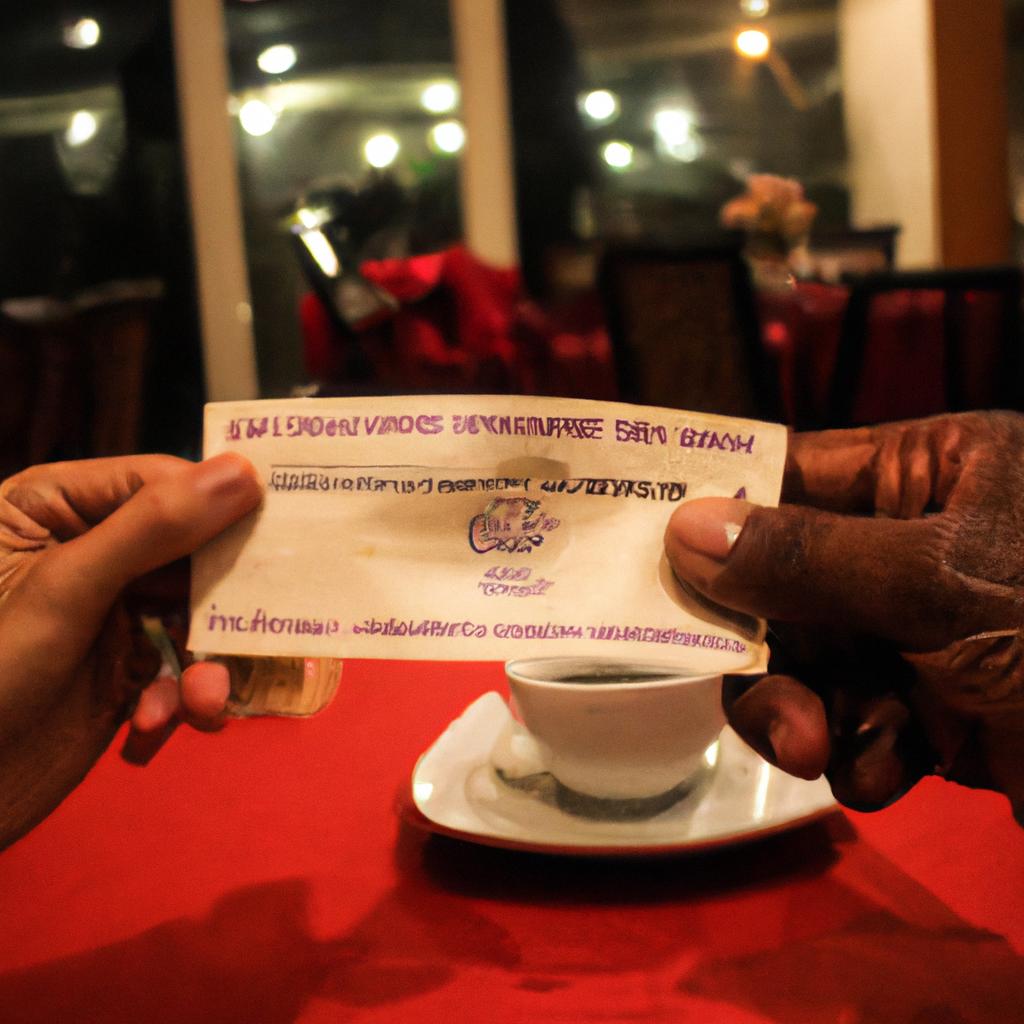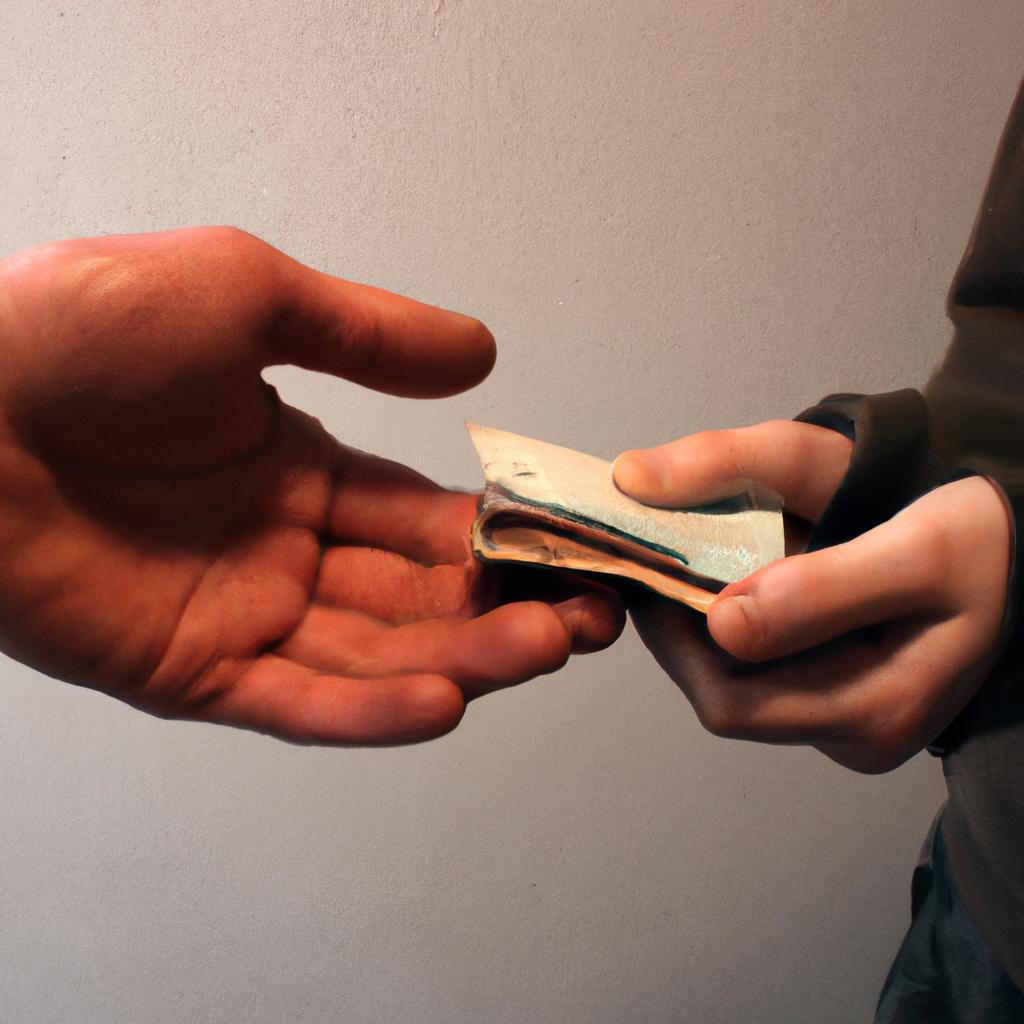In recent years, the bar and grill industry has faced numerous challenges, with many establishments struggling to survive. The COVID-19 pandemic further exacerbated these difficulties, leading to widespread closures and financial instability for restaurant owners. In response to this crisis, governments at various levels have implemented assistance programs aimed at providing much-needed financial aid to bar and grill owners. This article explores the different forms of government support available to restaurant owners, highlighting their importance in sustaining businesses during challenging times.
Consider the case of John, a small business owner who operates a popular bar and grill in downtown New York City. Like many others in his industry, John saw a significant decline in revenue due to restrictions on indoor dining imposed as a result of the pandemic. Faced with mounting bills and employee salaries that needed paying, he was uncertain about how long he could keep his doors open. However, thanks to government assistance programs targeted towards supporting local restaurants affected by COVID-19, John was able to access vital resources that allowed him to navigate through this difficult period successfully. His experience serves as an illustration of the valuable role that government aid plays in ensuring the survival and continuity of bar and grill establishments facing unprecedented challenges.
Eligibility requirements for government assistance
Imagine a scenario where John, the owner of a small bar and grill in a bustling city, is struggling to keep his business afloat amidst the economic downturn caused by the COVID-19 pandemic. In such situations, government assistance programs can provide much-needed financial relief to help restaurant owners like John overcome their challenges.
To be eligible for government assistance as a bar and grill owner, there are certain criteria that must be met. Firstly, one must demonstrate that their establishment has been significantly impacted by the pandemic, resulting in decreased revenue or temporary closure. This could involve providing evidence such as sales records or documentation of mandated closures due to public health guidelines.
Additionally, applicants may need to meet specific size requirements outlined by the government agency responsible for administering the aid program. For instance, they might consider factors such as annual revenue or number of employees when determining eligibility. These size requirements aim to ensure that funds are distributed equitably among businesses of varying sizes and prevent larger establishments from dominating limited resources.
Furthermore, some government assistance programs prioritize assisting socially disadvantaged individuals or businesses located in economically distressed areas. By targeting support towards these groups, policymakers aim to address existing inequalities exacerbated by the pandemic and promote equitable economic recovery.
In summary, eligibility for government assistance as a bar and grill owner involves demonstrating significant impact from the pandemic on your business operations, meeting specified size requirements set by relevant agencies, and potentially belonging to targeted groups prioritized for aid distribution. Understanding these eligibility criteria is crucial when navigating through available financial aid options provided by the government.
Moving forward into our next section about “Types of financial aid programs available for restaurant owners,” it becomes evident that understanding eligibility requirements opens doors to exploring various avenues of support offered by governmental bodies
Types of financial aid programs available for restaurant owners
Eligibility requirements for government assistance programs can vary depending on the specific program and its guidelines. To illustrate this, let’s consider a hypothetical example of a bar & grill owner named Lisa who is seeking financial aid from the government.
Before determining eligibility, Lisa needs to ensure that her establishment meets certain criteria set by the government. These requirements may include having a valid business license, complying with health and safety regulations, and being registered as an official food service provider. Additionally, Lisa will need to provide documentation such as tax returns, profit/loss statements, and proof of ownership or lease agreement.
To better understand the various eligibility factors involved in government assistance for bar & grill owners, here are some key considerations:
- Business Size: Some financial aid programs may have restrictions based on the size of the establishment. For instance, certain grants might be available only to small businesses with fewer than 50 employees.
- Financial Need: Government assistance often focuses on supporting those who face significant economic challenges. This could mean prioritizing businesses with low revenue or high operating costs.
- Location: Certain funding opportunities may target specific regions or communities in need of revitalization efforts. Bar & grill owners located in designated areas could potentially benefit from these targeted initiatives.
- Industry-Specific Requirements: In addition to general eligibility criteria, there might be industry-specific conditions that must be met for particular types of assistance programs.
To further demonstrate how different eligibility requirements can impact restaurant owners’ access to financial aid options, consider the following table:
| Program | Eligibility Criteria |
|---|---|
| Small Business Grants | Must have less than 100 employees |
| Restaurant Revitalization Fund | Must show pandemic-related revenue loss |
| Community Development Block Grant | Located within specified low-income area |
| Tax Credits | Complies with energy efficiency standards |
By understanding these diverse qualification factors and exploring relevant government assistance programs, bar & grill owners like Lisa can determine their eligibility and pursue financial aid opportunities. In the subsequent section, we will delve into the process of applying for government assistance as a bar & grill owner, providing valuable insights on navigating the application procedures effectively.
How to apply for government assistance as a bar & grill owner
Government Assistance for Bar & Grill Owners: Financial Aid for Restaurant Owners
Types of financial aid programs available for restaurant owners can provide much-needed relief during challenging times. For instance, consider the case of Jane, a bar and grill owner who experienced a significant decrease in revenue due to the COVID-19 pandemic. She was able to access government assistance programs tailored specifically to support businesses like hers.
In order to navigate through the application process successfully, it is crucial for bar and grill owners to understand the various types of financial aid programs offered by the government. Here are some key examples:
- Small Business Administration (SBA) Loans: The SBA offers low-interest loans that can help bar and grill owners cover operating expenses, including rent or mortgage payments, payroll costs, and utilities.
- Economic Injury Disaster Loan (EIDL): This program provides working capital loans to small business owners affected by natural disasters or unforeseen events such as pandemics. EIDL funds can be used for fixed debts, payroll, accounts payable, and other bills that cannot be paid due to economic disruptions.
- Paycheck Protection Program (PPP): Designed to incentivize businesses to retain their employees during times of crisis, this forgivable loan program covers payroll expenses as well as certain operational costs like rent or mortgage interest and utilities.
- State-specific Grants: Some states offer grants specifically targeted at supporting local bars and restaurants during difficult periods. These grants may have specific eligibility requirements but can provide essential funding for ongoing operations.
To better understand these options and more effectively compare them, refer to the following table summarizing key features:
| Program | Purpose | Eligibility |
|---|---|---|
| SBA Loans | Cover operating expenses | Small businesses |
| EIDL | Provide working capital | Affected by natural disasters |
| PPP | Retain employees | Businesses retaining staff |
| State-specific Grants | Support local bars and restaurants | Varies by state |
Obtaining government assistance as a bar and grill owner requires careful consideration of eligibility criteria, application requirements, and documentation. By staying informed about available programs and understanding the specific needs of your business, you can make informed decisions to secure financial aid that will help sustain your establishment during challenging times.
Key considerations when seeking financial aid for your business include assessing the impact of the pandemic on your revenue, gathering all necessary documents before applying, and ensuring compliance with program guidelines. With this in mind, let’s explore how you can effectively apply for government assistance as a bar and grill owner.
Key considerations when seeking financial aid for your business
Having understood the process of applying for government assistance as a bar & grill owner, it is important to consider key factors before diving into the application process. Let’s explore some crucial aspects that can help you make informed decisions and maximize your chances of obtaining the needed financial aid.
Example: Imagine you own a popular bar & grill in a bustling city known for its vibrant nightlife scene. Due to the sudden economic downturn caused by a global pandemic, your business has been severely impacted, leading to reduced revenue and mounting expenses. In such challenging times, accessing government assistance can be critical to sustain your establishment.
-
Eligibility criteria: Government assistance programs often have specific eligibility requirements that must be met in order to qualify for support. These criteria may include factors like annual revenue thresholds, number of employees, industry-specific regulations, and proof of financial hardship due to unforeseen circumstances (such as COVID-19). It is essential to carefully review these prerequisites before proceeding with any applications.
-
Documentation and paperwork: When applying for financial aid, expect extensive documentation and paperwork requirements. This might involve providing detailed financial statements, tax returns, profit-and-loss statements, bank statements, proof of ownership or lease agreement for your premises, licenses and permits information, employee payroll records, and other relevant documents depending on the program you are applying for. Ensure you gather all necessary paperwork and keep them organized throughout the application process.
-
Program options: Familiarize yourself with various government assistance programs available at both federal and state levels catering specifically to bar & grill owners or restaurant businesses in general. Some common options could include grants (non-repayable funds), loans (with favorable terms), tax credits or incentives aimed at supporting small businesses during difficult times. Compare the benefits, limitations, interest rates (if applicable), repayment conditions (for loans), and potential impact on your overall finances before making a decision.
-
Timelines and deadlines: Government assistance programs often have specific timelines or deadlines for application submission, review, and disbursement of funds. It is crucial to be aware of these timeframes in order to plan accordingly and submit your applications well before the deadline. Late submissions may result in delays or even exclusion from receiving financial aid.
| Key Considerations |
|---|
| Eligibility criteria |
| Documentation and paperwork |
| Program options |
| Timelines and deadlines |
Understanding these key considerations will help you navigate the complex landscape of seeking financial aid as a bar & grill owner. In the subsequent section, we will explore government resources that can further assist you in overcoming various financial challenges faced by businesses like yours during uncertain times.
Government resources for navigating financial challenges
Government Assistance for Bar & Grill Owners: Financial Aid for Restaurant Owners
Transitioning from the previous section, let’s delve into the available government resources that can help bar and grill owners navigate financial challenges. To illustrate how these resources can be beneficial, consider this hypothetical example:
Imagine a small neighborhood bar and grill struggling to stay afloat due to decreased foot traffic during the pandemic. The owner is desperately seeking financial assistance to cover operating costs and keep their employees on payroll. In such situations, exploring government aid programs becomes crucial.
When it comes to obtaining financial aid, bar and grill owners should consider several key factors before applying. These considerations include assessing eligibility requirements, understanding program limitations, calculating potential loan amounts or grants available, and anticipating any necessary documentation needed for application submission. By carefully evaluating these aspects, owners can make informed decisions about which assistance options are most suitable for their establishment.
To further understand the various forms of government support available, here are some common types of assistance programs aimed at helping restaurant businesses weather challenging times:
- Small Business Administration (SBA) Loans: Low-interest loans through SBA provide working capital to eligible restaurant owners.
- Paycheck Protection Program (PPP): This initiative offers forgivable loans designed to incentivize maintaining staff payrolls.
- Economic Injury Disaster Loan (EIDL) Advance: A grant-like advance providing emergency funds with no repayment obligations in certain circumstances.
- State-specific Relief Programs: Many states have developed additional relief measures tailored specifically for local bar and grill establishments.
These examples highlight just a few avenues through which government assistance can potentially alleviate financial burdens faced by bar and grill owners. It is essential for business proprietors to thoroughly research and explore all relevant programs offered by federal, state, and local governments as they may vary based on location.
In the subsequent section, we will delve into success stories of bar and grill owners who received government assistance — showcasing real-life scenarios where these programs made a tangible difference in their businesses. By examining these cases, we can gain valuable insights into the practical impact of government aid and further understand how it can positively transform the trajectory of struggling establishments.
Success stories of bar & grill owners who received government assistance
Government Assistance for Bar & Grill Owners: Financial Aid for Restaurant Owners
Navigating the financial challenges faced by bar and grill owners can be overwhelming. However, there are government resources available to provide financial aid and support during these difficult times. In this section, we will explore some of these resources and how they have helped restaurant owners in need.
One example of a successful case is Mary’s Bar & Grill located in downtown Houston. Despite being a popular establishment known for its delicious food and vibrant atmosphere, Mary’s Bar & Grill was struggling financially due to the impact of the COVID-19 pandemic. The owner, Mary Johnson, decided to seek assistance from government programs designed specifically for small businesses in the food industry. With their help, Mary’s Bar & Grill was able to receive financial relief through grants and loans, enabling them to pay rent and retain their employees.
- Grants provided by federal agencies specifically targeted towards restaurant owners.
- Low-interest loans offered by local governments to cover operational costs.
- Tax credits and deductions that can alleviate financial burdens.
- Business counseling services aimed at helping restaurant owners develop strategies for sustainability.
| Name | Location | Government Program | Amount Received |
|---|---|---|---|
| Maria’s Bistro | Seattle | Small Business Grant | $20,000 |
| Joe’s Tavern | Chicago | Economic Injury Disaster Loan | $50,000 |
| Tony’s BBQ Joint | Atlanta | Employee Retention Credit | $15,000 |
| Sarah’s Sports Pub | Los Angeles | Small Business Counseling | N/A |
These success stories and resources demonstrate the government’s commitment to supporting bar and grill owners during challenging times. By leveraging available programs, restaurant owners can access financial aid that may help them overcome various obstacles.
In conclusion, it is crucial for bar and grill owners to be aware of the government assistance options available to them. Programs such as grants, loans, tax credits, and counseling services have proven beneficial in helping establishments navigate financial challenges successfully. Through these initiatives, restaurant owners like Mary Johnson from Mary’s Bar & Grill have been able to sustain their businesses and continue providing enjoyable experiences for their customers.
 Catch 22 MKE
Catch 22 MKE



